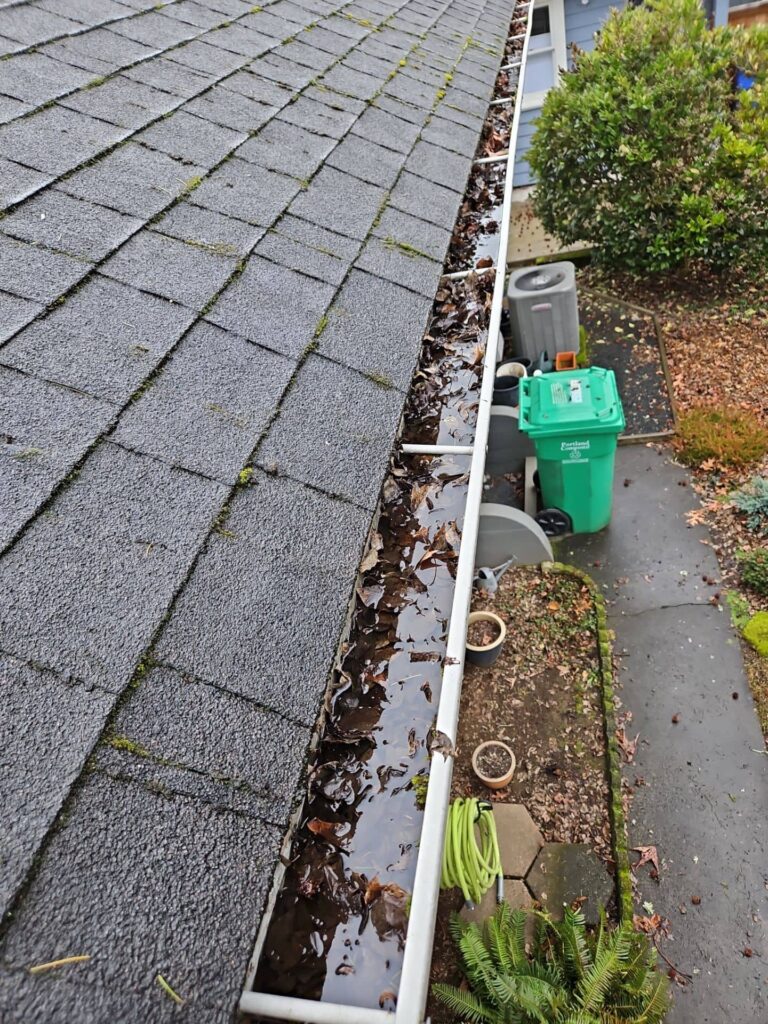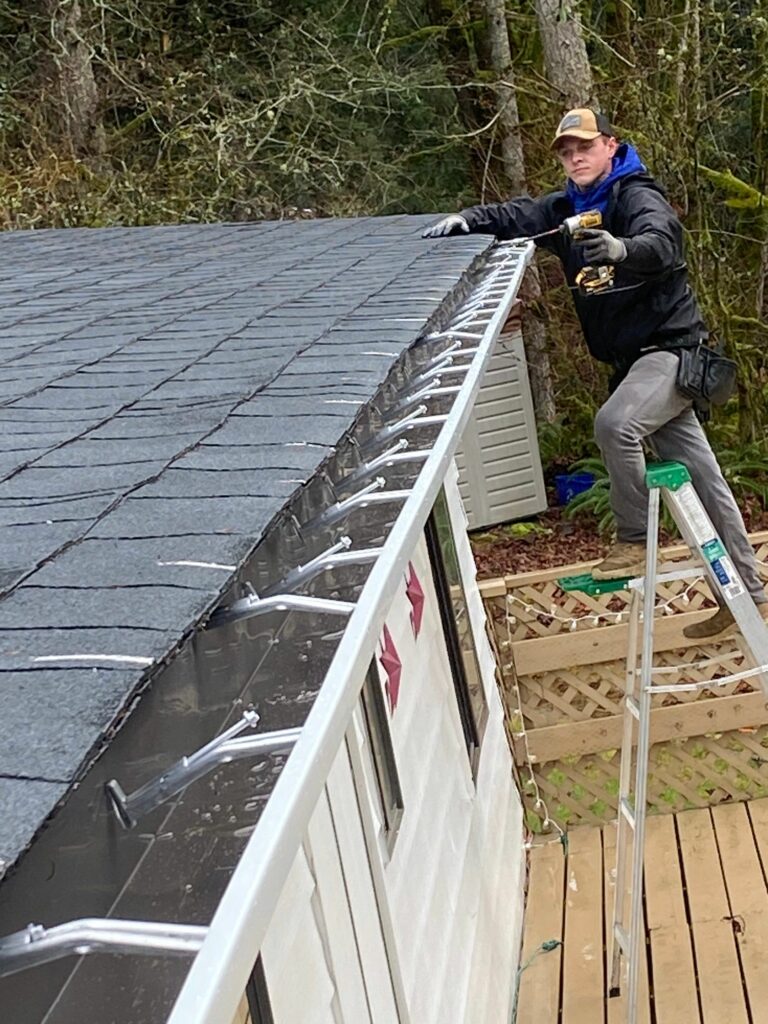Picture this – heavy rain pouring down onto your roof, only to find out that your gutters are clogged and overflowing, causing water damage to your property. Would you believe that this situation could have been easily avoided with regular gutter cleaning? In this blog post, we will delve into the world of gutters, exploring their purpose, importance, and the many benefits of keeping them clean and well-maintained.
Understanding Gutters
Before diving into why gutter cleaning is crucial, let’s first understand what gutters are and their role in a home. Gutters are narrow channels typically made of metal, vinyl, or other composite materials that are attached to the eaves or the lower edge of a roof. Their primary function is to collect and channel rainwater away from the foundation, preventing water damage to your home’s structure and landscape.
Gutters come in various types, including sectional gutters, seamless gutters, and different materials like aluminum, copper, or steel. They are designed to capture rainwater runoff and direct it towards downspouts, which then channel the water away from the foundation and into a designated drainage area, such as a rain barrel or a designated storm drain. By effectively managing water flow, gutters protect your home’s foundation, roof, and landscaping, ensuring long-term durability and minimizing the risk of costly repairs.
Importance of Gutter Cleaning
Preventing Water Damage
The primary purpose of gutters is to collect rainwater and direct it away from the foundation. However, when gutters become clogged with leaves, twigs, and debris, the water cannot flow freely. This leads to overflow, causing water to cascade down the sides of your home, puddling around the foundation. Over time, this excess moisture can seep into the foundation, resulting in structural issues, including cracks, shifting, and even basement flooding.
Regular gutter cleaning is essential to prevent such water damage. By keeping your gutters clean and debris-free, you ensure that rainwater can flow unobstructed and be properly channeled away from your home. This simple maintenance task can save you from the headache and expense of foundation repairs and water damage restoration.
Protection Against Mold and Mildew
Another adverse consequence of clogged gutters is the proliferation of mold and mildew. When water is trapped in the gutters due to debris buildup, it becomes stagnant, creating a breeding ground for mold spores. These spores can easily find their way into your home, affecting indoor air quality and potentially leading to health issues, such as respiratory problems and allergies.
Regular gutter cleaning not only prevents the accumulation of stagnant water but also eliminates favorable conditions for mold and mildew growth. By keeping your gutters clean, you reduce the risk of these harmful substances infiltrating your home and maintain a healthier living environment for you and your family.
Maintaining Roof Health
Your roof is your home’s first line of defense against the elements. However, clogged gutters can compromise its integrity. When gutters are filled with debris, water can accumulate and become trapped. This trapped water can seep under shingles, leading to roof leaks, rot, and overall deterioration.
By regularly cleaning your gutters, you allow rainwater to flow freely, preventing any potential damage to your roof. This proactive maintenance measure ensures that your roof remains in good condition, prolonging its lifespan and reducing the need for costly repairs or premature replacement.
Preserving the Landscaping
Beautifully landscaped yards enhance the curb appeal of any home. However, clogged gutters can pose a threat to your carefully manicured lawns and gardens. When water overflows from blocked gutters, it cascades down onto your landscape, causing erosion, damaging plants, flowerbeds, and walkways.
Regular gutter cleaning prevents this overflow and preserves your landscaping investment. By keeping your gutters clear, rainwater will flow properly, avoiding any unwanted water damage to your yards. This ensures that your landscape remains vibrant and beautiful, enhancing the overall aesthetic appeal of your home.
Signs of Clogged Gutters

Now that we understand the importance of gutter cleaning, let’s explore some common signs that indicate it’s time for a thorough cleaning:
- Overflowing water: During rainstorms or after heavy downpours, water overflowing from your gutters is a clear indication of a blockage.
- Sagging or detached gutters: Excessive debris buildup can weigh down gutters, causing them to sag or even detach from the roofline.
- Water stains on exterior walls: If you notice water stains or streaks on the walls beneath your gutters, it’s a strong indicator that water is escaping from clogged gutters.
- Vegetation growth: If you see plants or vegetation growing out of your gutters, it’s a sure sign that they are filled with decomposing organic matter.
- Roof leaks and damage: When gutters fail to properly channel water away, it can seep into your roof, causing leaks and damage to both the interior and exterior of your home.
It’s crucial to pay attention to these warning signs and address them promptly through gutter cleaning to avoid costly repairs and potential long-term damage to your property.
DIY Gutter Cleaning
While some homeowners prefer hiring professionals for gutter cleaning, many choose to take matters into their own hands. Here is a step-by-step guide for effective and safe DIY gutter cleaning:
- Gather the necessary tools: A sturdy ladder, work gloves, a scoop or trowel, a bucket or trash bags, a garden hose with a spray nozzle, and safety goggles.
- Safely position the ladder: Ensure the ladder is stable and placed on a level surface. Avoid leaning the ladder against the gutters, as it can cause damage.
- Remove debris by hand: Begin by manually scooping out leaves, twigs, and other debris from the gutters. Deposit the collected debris into your bucket or trash bags.
- Flush the gutters and downspouts: Use a garden hose with a spray nozzle to flush out any remaining debris or sediment. Start from the opposite end of the downspouts and work your way towards them, ensuring water flows freely.
- Check for proper water flow: Verify that water is properly flowing through the gutters and downspouts. If there are any obstructions, use a plumber’s snake or a similar tool to clear them.
- Repair any damages or seal leaks: Inspect the gutters for any damages, such as cracks, gaps, or loose joints. Repair or replace damaged sections promptly. Additionally, seal any leaks with an appropriate gutter sealant.
Remember, always practice caution and prioritize safety during any DIY project, including gutter cleaning. If you are uncomfortable with heights or lack the necessary tools, it’s wise to consult a professional gutter cleaning service.
Professional Gutter Cleaning
While DIY gutter cleaning is a viable option for many homeowners, there are clear advantages to hiring professional gutter cleaning services. Consider the following benefits:
- Expertise and experience: Professional gutter cleaners possess the necessary knowledge, skills, and experience to perform a thorough and efficient job.
- Safe and efficient debris removal: Professionals have the right tools and equipment to safely remove debris from your gutters without causing any damage to your home or risking personal injuries.
- Identification of potential gutter system issues: Professionals can spot gutter problems, such as sagging, leaks, or improper installations, that may require prompt attention. Their expertise ensures that these problems are addressed before they escalate into costly repairs or replacements.
Frequency of Gutter Cleaning
The frequency at which you should clean your gutters depends on various factors, including location, climate, and the surrounding vegetation. As a general guideline, it’s recommended to clean your gutters at least twice a year – once in the spring and again in the fall. However, certain regions with heavy foliage or frequent storms may require more frequent cleanings.
Additionally, it’s essential to perform gutter cleanings before and after significant storm events to ensure that your gutters are clear and prepared to handle excessive rainfall.
Gutter Maintenance Tips

In addition to regular cleaning, there are several preventive measures and maintenance tips to keep your gutters in optimal condition:
- Gutter guards: Consider installing gutter guards or screens to minimize debris accumulation and reduce the frequency of cleanings.
- Regular inspections: Routine maintenance checks can help you identify early signs of gutter issues, such as loose brackets, leaks, or sagging sections. Addressing these problems promptly can prevent more significant issues down the line.
- Proper downspout placement: Ensure that your downspouts direct water at least five feet away from your foundation to prevent water from pooling near your home.
- Trim surrounding trees and foliage: Trim back overhanging branches and remove any vegetation that may contribute to clogged gutters. This proactive step will reduce the amount of debris that falls into your gutters.
Conclusion
Regular gutter cleaning is an essential task that should not be overlooked by homeowners. By understanding the purpose and importance of gutters, we can grasp the significant benefits of keeping them clean and well-maintained. Preventing water damage, protecting against mold and mildew, maintaining roof health, and preserving the landscaping are just a few reasons why gutter cleaning should be a top priority.
By recognizing the warning signs of clogged gutters, implementing DIY cleaning measures or enlisting the help of professionals, and following recommended maintenance tips, homeowners can ensure that their gutters function effectively, providing continuous protection for their homes.
Remember, neglecting gutter cleaning today can lead to significant expenses and headaches tomorrow. Take action now to maintain a structurally sound and protected home.

